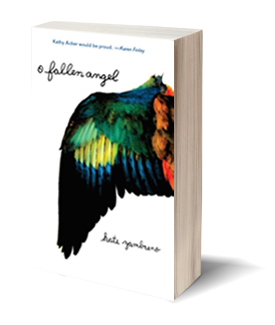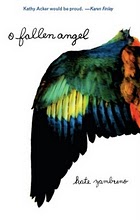Win Kate Zambreno’s O Fallen Angel
 The wonderful Kate Zambreno has offered to give three copies of her book O Fallen Angel to HTMLGIANT readers. In our recent interview with her Kate said:
The wonderful Kate Zambreno has offered to give three copies of her book O Fallen Angel to HTMLGIANT readers. In our recent interview with her Kate said:
“I had these three characters haunting me—Maggie is in many ways a grotesque carciature of another character I had written before, Ruth in an unpublished novel Green Girl, a sort of postfeminist libertine who’s also quite passive and tragic, sort of like if a Jean Rhys heroine was alive now or Clarice Lispector’s Macabea.”
As such, we’d like to hear about your inspirations, or stealings. Comment with a brief confession of something you’ve manipulated or stolen, language-wise or other. Kate will pick three winners sometime late Wednesday.
[Also, this week a new limited edition and only briefly available piece from Kate has been published by Legacy Pictures: I AM SHARON TATE.]
Murderous Fucking Murderous: An Interview with Kate Zambreno
Kate Zambreno go es for the throat. Or at least her language does, in the manner of those who came to wreck not by demanding, but by will. Her debut novel, O Fallen Angel, (which won the Chiasmus Press ‘Undoing the Novel’ contest) arrives in the grand spirit of Acker, Artaud, Burroughs, but where these are A and A and B, Kate is Z in full: her own, slick, squealy, and of another light. As well: Fun, funny, fucked, freaklit, surprising, terrifying, gorgeous. Her words are a meat we surely want more of, quickly.
es for the throat. Or at least her language does, in the manner of those who came to wreck not by demanding, but by will. Her debut novel, O Fallen Angel, (which won the Chiasmus Press ‘Undoing the Novel’ contest) arrives in the grand spirit of Acker, Artaud, Burroughs, but where these are A and A and B, Kate is Z in full: her own, slick, squealy, and of another light. As well: Fun, funny, fucked, freaklit, surprising, terrifying, gorgeous. Her words are a meat we surely want more of, quickly.
On the event of her book’s release (which you can pick up now through SPD) (and read an excerpt of at The Collagist) (and see read live in Chicago this Saturday at Quimby’s), Kate and I spent some time discussing via email her new book, her influences, art, language, terror, cliches, Playboy, Bacon, body fluids, and all things therein.
* * *
BB: The copy of the back of O Fallen Angel says it was inspired by Francis Bacon’s Three Studies for Figures at the Base of a Crucifixion. The images in that painting are quite striking, esp. in that I didn’t look it up until after the text. The orange and white contrast, with the odd body shapes on pedestals as if vivisected and mutated bits of humans stuck on gross smooth forms really resonated in retrospect with the three rotating voices of your text, and made me realize a lot about it in seeing, applying the imagery to the residual effect of your words. I wonder if you could talk about how that image struck you as a way of opening the door here, what effect it had in a process sense, and perhaps how it continued to inform the structure or tone of the book.
Kate Zambreno: I’ve been really haunted by that triptych. For a while I lived in London, really when I first started writing I worked in fiction at Foyle’s bookshop and read all of this experimental fiction for the first time—Ann Quin and Elfriede Jelinek and all the Peter Owen books, Jane Bowles, Anna Kavan—and ran the cult fiction section. I would go to the Tate Museums to the Francis Bacon room in the Tate Britain where they had that first major triptych. I worshipped and gawked at that first triptych, that orange gruesome horror it filled me with such violence and ecstasy. Those three gruesome distorted bodies, the open mouths in Bacon, the silent scream. I’m really interested in the silent scream how we are muted in society, Bacon’s mouths, Helene Weigel’s mouth wide open screaming an empty loss in Mother Courage, Munch’s Scream. I guess that’s some of what I was writing towards in O Fallen Angel, what I’m really always trying to write towards, those who are dumb and deaf but inside writhing with unwordable agony, and are diagnosed as selectively mute, those who lack language so they commit violent acts, they are only given language that is banal and well-behaved , the need to burn burn burn but they cannot so they set fire to themselves, they self-immolate (as one of my characters does literally and the other does symbolically). The spectacle of this, of the wound, to borrow an idea from Mark Seltzer’s cultural study of the serial killer. And we gather around this wound, this trauma in our talk-show society, but then we also suppress it, the anguish, sadness, we medicate it. I also really love how much a reader Bacon was and we both share a passion for the Greeks, the Greek tragedy really inspired O Fallen Angel, especially The Oresteia, the choruses threaded, some of the imagery, and Malachi is a Cassandra figure, ranting, raging, never believed.
